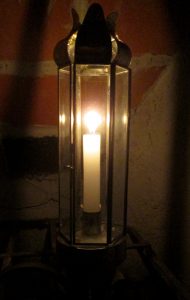Many years ago a dear French friend told me a true story about her father. What I can recall from that story is this: During the second world war, in Paris, before my friend was born, her parents were newlyweds in their early twenties. Her father was a policeman. His beat was in the posh 16th Arrondissement.
At some point, he noticed something ominous was happening in the neighborhood he patrolled. Jews were disappearing. He knew that many of the owners and occupants of the apartment buildings on his beat were Jews, so he took it upon himself to warn them privately: Get out – while you can! These people knew him – a nice, earnest, Catholic young man – and they trusted him. They heeded his warning. They and their families fled Paris just in time, thereby escaping capture by the Nazis.
My friend’s father – whom I never knew because he died in a drowning accident before my friend and I met when she and I were in our mid-twenties – never, as far as I know, earned any medals for this act of selflessness and bravery. But to me, he became a hero. I made an enduring statue of him in my mind — a skinny young man in a French policeman’s uniform, on a pedestal, with the inscription beneath: This is what heroism can look like.
Ever since high school, when we all had to read The Diary of Anne Frank in English class, I’ve sought out well-written books about the darker periods in recent history and asked myself as I read, How would I have behaved if I had lived then? What would I have done?
For example, would I have been an abolitionist, like Sarah Grimké of Charleston, South Carolina, the courageous protagonist of Sue Monk Kidd’s brilliant historical novel, The Invention of Wings? Or would I have been like most of the other comfortable plantation owners and their families, rationalizing the evils of slavery away by claiming it was “good for the economy” and therefore the young nation? Imagine having to PAY all those plantation workers! a slavery apologist might say.
Or if I had lived in Nazi Germany: Would I have been a “good,” churchgoing German villager, keeping my head down, going about my day-to-day activities and chores without asking any questions, believing that my duty was to obey the laws and be loyal to and respectful of those in authority? (Heil Hitler!) Or would I have been like Trudi Montag, the protagonist of Ursula Hegi’s life-altering novel Stones in the River, and bravely broken laws by hiding Jews in that village and saving their lives?
I like to think of myself as brave – more concerned about my soul than my skin.
Which brings me to today, the day that happens to be the darkest day of the year, the winter solstice, in which the future, I’m afraid, also looks quite dark. The man who will be the next president of the once-accurately labeled “United” States represents an ominous figure. He is, by all accounts, unstable, unqualified, and unprepared to be the leader of the free world. On Inauguration Day he’ll vow to uphold the Constitution – a document he’s likely never even read. He prides himself on not needing to read because he’s “smart enough.”
Those who believe him and trust him to do good by them have never, I suspect, had the great misfortune of crossing paths with the likes of a sociopath. Good people with good intentions and positive outlooks, who think, Give him a chance! All will be well! could not possibly wrap their minds around his way of thinking and his apparently unquenchable desire for more wealth, more power, and more adoration – at everyone else’s expense.
Well, then, what can we do? How can we find our way through the darkness that appears to be lying ahead? It seems to me that some of the answers might be: Turn on the lights and keep them on. Stay awake, aware, alert. Keep our heads up and our eyes open. Read reliable news accounts. Show up, stand up, speak up. Write and share truths. Hold fast to dignity and decency, which seem to be, along with democracy, endangered. Resist complacency. Be brave. Go high.

